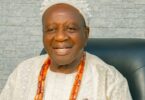Remarks by Senator Asuquo Ekpenyong at the Efik National Convention, Atlanta, USA
Your Excellency, the Executive Governor of Cross River State, Prince Bassey Edet Otu;
President of the Efik National Association, Obong Ekpe Otu Otu;
Distinguished principal officers and elder statesmen, including Professor Eyo Etim Nyong;
Esteemed ladies and gentlemen,
It is my great honor to be here this afternoon to engage with the Efik Community National Association here in North America at the Efik National Convention.
Let me start by thanking the Governor profusely for my presence here. Earlier this week, I had actually received an invitation from the Association, but because we were still having plenary at the chambers in Abuja, I wasn’t sure I was going to be able to make it. But earlier this week, the Governor called me. Him being a former senator or a non-serving senator; in Nigeria we don’t have what they call a “former senator”he said, “There are 109 seats in the Senate, and there is only one seat that represents the Efik people. You are their representative. You must be there.” And he ensured my conveyance expressly, making sure logistics and tickets were available.
So, Your Excellency, I want to thank you.
I was elected on February 25th, 2023, to the Nigerian Senate for the Cross River South Senatorial District. On June 13th, 2023, I was inaugurated into Parliament. Well, I think our system of democracy is very familiar to you because it’s exactly how the American system is where you have the Executive, you have the Legislature, and you have the Judiciary. And we have a bicameral legislature as well, where we have a Senate at the federal level and a House of Representatives.
I represent Cross River South in the Nigerian Senate, and our role is to be in Abuja at the federal level to support the Executive at the state level in terms of the vision and the goals of the projects that are being implemented by the administration.
And I want to say here that Governor Bassey Edet, who just spoke to you in his usual way, was being extremely modest about the achievements of his administration over the last two years. He’s not one that likes to blow his own horn. Over the last few years, the state government has done remarkably well.
We started off by pointing out insecurity, but I’m not sure you know the details of how the insecurity was before the concept of this administration. Maybe you did; maybe you had scary tales about kidnapping “If you come into Calabar, stay away,” or “You have to pay ransom for one of your relatives.” All that is a thing of the past.
Beyond that, he’s focused on high-level infrastructure at the state level. He has not said this, but he’s close to completing the Obudu Cargo International Airport. There is no service hub; he has expanded the Cally airline. Just two days ago, he took delivery of a new Bombardier aircraft, and more vessels are coming.
In terms of infrastructure road infrastructure he’s opened up the Southern Central District in a way that I didn’t think was possible. If you know the Calabar-Odukpani-Itu Road and the state of it, and how going from Calabar to Itu would take you two hours, he is bypassing all that by opening up the Adiabo Super Road, taking the journey time from Calabar to Itu to a shorter time and so on and so forth.
The deep seaport he’s mentioned has some level of investments he has to do to get it ready for groundbreaking. So, the state governor is working. The administration is working. Our role in Abuja is to complement those efforts, and that’s what we’ve been trying to do in our own modest way.
As I stated, our role is to complement the government in Abuja. The role of any parliamentarian is threefold: lawmaking, representation, and oversight. It’s my duty as a lawmaker. Over the last 25 months since I’ve been serving, I’ve been able to propose on the floor ten new bills, and two of them are actually establishment bills. One was the South-South Development Commission Establishment Bill, which went through the Senate very speedily. It was a lot of hard work, to be honest. Getting establishment bills out of the gate takes a lot of lobbying and a lot of consultation with the other senators. After a rigorous process and healthy debate, when it is passed, it has to go to the lower chamber, the House of Representatives, for concurrence, and then it goes to the President for assent.







